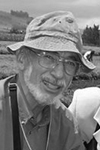The H. J. Dubin Student Travel Fund is dedicated to the Peace Corps. Preference for this travel award will be given to APS graduate student members working on diseases of food crops with an international focus preferably interested in an international career.
Donate to the Fund
 H. Jesse Dubin
H. Jesse DubinH. J. Dubin graduated from SUNY College of Forestry [now College of Environmental Science and Forestry] in 1964, many were imbued with the spirit of President Kennedy’s 1960 statement “ask not what your country can do for you but what you can do for your country.” At least six of his classmates joined the Peace Corps. Most of them went to Chile to work in forestry. Dubin was sent to a regional university (Universidad Austral) in the south to teach basic forest pathology, which was his interest in college. Between October 1964 and December 1966, he taught and did extension work. In the process, they found a new pathogen, Dothistroma pini, on Pinus radiata, the major plantation species in Chile. His Peace Corps time convinced him that he wanted to continue to do international work, especially in food production. Meanwhile, the work on D. pini helped him get a USFS assistantship at Colorado State University (CSU) working with John Staley on foliar blights of pines. Most importantly, it was at CSU where he met his wife Gloria, who was doing graduate studies in Latin American literature.
After he finished his M.S. degree, he went to the University of California-Davis to work on European apple canker with Harley English. Dubin finished his doctorate in 1972 and received a Foreign Area Fellowship to work at his previous Peace Corps post in Chile to teach plant pathology and start a virus-free potato program. In 1973, due to the political situation in Chile, he moved on to the University of Maine and then, in 1975, the International Maize and Wheat Improvement Center (CIMMYT) wheat program offered him a job as triticale/wheat pathologist in Mexico. This brought him back to his career goal to work in international agriculture and food production in developing countries. Dubin learned that my Peace Corps service helped Norman Borlaug and Glenn Anderson make their selection.
Over a period of more than 24 years, Dubin was privileged to work with scientists like Borlaug, Anderson, Frank Zillinsky, Sanjaya Rajaram, and many others. In the ensuing years, he worked in Mexico, the Andean Region of South America, and South Asia. He served as regional pathologist/breeder in both regions and later on in Mexico as subprogram leader, pathology; leader, Seed Health Unit; and lastly as associate director, Wheat Program. In 1999, Dubin retired from CIMMYT. It was a very rewarding career and the Peace Corps with its philosophy helped guide him in it. In many ways, the world has not changed that much and the Peace Corps is more relevant than ever.
Lastly, one might ask why support a student travel fund at APS? In his years abroad, APS meetings and members were very important in helping him in his work. He would come from overseas for vacation and looked forward to these meetings to get up to date in pathology. Roland Line and him used to sponsor ad hoc cereal workers socials years ago, and some good international cooperative work and information exchange came out of them. It is heartening to see APS become truly international. As well, his work with the APS Office of International Programs and its members, through the years, were very fruitful. Dubin believed that it is critical for graduate students to participate in APS meetings and established this travel fund as a way to contribute to this effort.
